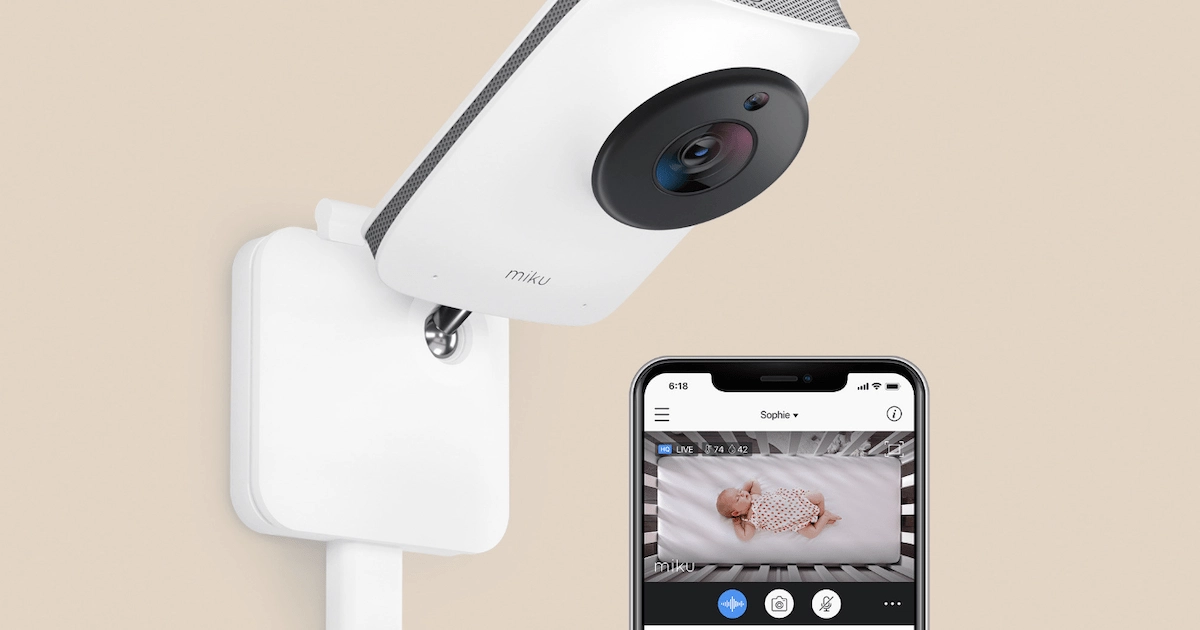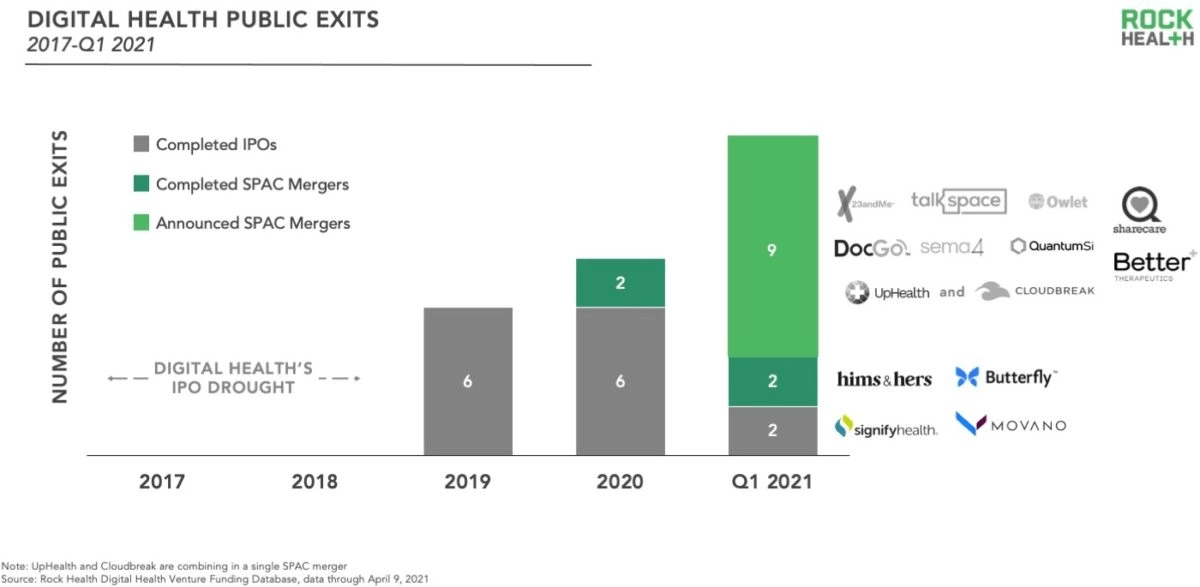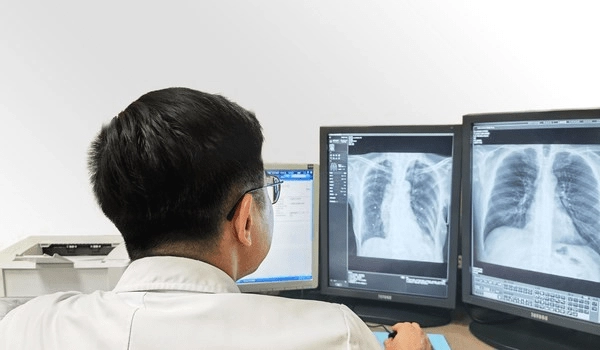

Digital healthcare digest — April 2021
Hey, let’s see what are the most interesting things that happened in the digital health industry in April.
New product and launches in the digital health industry
Garmin, a wearable company, rolled out a new GPS smartwatch, Venu 2, that can track sleep, specifically about light, deep, and REM sleep phases, and sense pulse oxygen and respiration rate within them.
Verizon launches its virtual care platform called BlueJeans Telehealth: “a simple, smart, and trusted way for providers and patients to conduct data-driven virtual care conversations.” A lot of health system clinicians and healthcare decision-makers have been involved in the design process to deliver a high-quality experience, — and Verizon says that is their differentiating factor from other virtual care solutions on the market.
MindRhythm, a new stroke-triage company that has been launched on April, 27, announced the beginning of the clinical trial that will test the effectiveness of their stroke-detecting technology and started enrolling patients. The study has been conducted at Wayne State University, and it will research MindRhythm’s main product, Harmony, which helps emergency responders detect Large Vessel Occlusion (LVO) strokes to triage patients to a healthcare provider that can treat them.

A company called Miku that develops baby monitors, released a new tool called Miku Pro Smart Baby Monitor: it helps parents track baby’s breathing and sleep patterns remotely. It’s contact-free and can be used for kids from 0 to 12 years.
Nabla is building a healthcare super app for women: it was launched this month, already raised $20.2M, and started working with a team of doctors. The French startup wants to increase the accessibility of care; one of their main competitive features is that users can ask free questions from any specialists for free (although the number of questions is limited per month.)
Samsung developed a medical device that utilizes older models of its Galaxy smartphone series to screen for eye diseases in underserved areas. It works like this: old unused Galaxy phone captures an image (with eyes) through the lens; then, an AI algorithm analyzes and diagnosis the image for eye diseases like glaucoma, age-related muscular degeneration, and diabetic retinopathy, connects to the specialty app that gathers patient data and proposes treatment options.
Digital health startup funding in April
Vietnam-based healthcare booking app, Docosan, gets $1M in the seed round. Docosan helps people avoid long queues by offering them to search for doctors in the app and book them right there. The investment was led by a Taiwan-based early-stage investor and accelerator program, AppWorks.
Proximie from the UK raised $38M in Series B. Proximie develops a surgery platform that uses AR, ML, and AI to help doctors participate in the operating room remotely and guide surgeries in real-time. The data from procedures are captured for later analysis to improve surgical techniques and achieve better patient outcomes.
Kaia Health, a startup based in the USA, raised €62 in Series C to expand its clinical capacity and treatment options for musculoskeletal and chronic obstructive pulmonary diseases in America and Europe.
Australian platform for addiction support, Arli, raised $1.9M in the seed round—they offer free coaching and support for people with any kind of addiction and any stage of it—plans to expand to America.
Legacy, a startup that aims to educate men about their fertility through the semen analysis that can be conducted independently at home with mail-order test kits, raised $10M in series A. With new funds, they want to expand geographically and reach out to more patients.
Digital healthcare market news, deals, and partnerships
Microsoft acquires Nuance Communication, a company that develops AI-driven software for hospitals with speech recognition, for $19.7B, securing its foothold in digital health.
Bright Health, an insurance giant, buys Zipnosis, a startup that re-imagines telemedicine to lower costs and increase accessibility, affordability, and quality of care.
GoodRx, a company that develops a prescription price comparison platform, acquired HealthiNation, a video producer that specializes in health ed content. The sum of the deal is undisclosed. GoodRx hopes to use the deal to push its mission on improving healthcare consumers’ knowledge so they could make informed decisions.
SPAC deals have taken over the digital health world, according to Rock Health’s research: there are more SPAC deals conducted in Q1 of 2021 than for the entirety of 2020. Exists through SPAC deals are extremely popular within high growth sectors and digital health is one of them — apart from that, pent-up pressure from 2017-2018 — when there was no IPO activity at all — might have influenced the founders, and they decided to go exit the other way. It’s quicker to conduct a SPAC deal than prepare for an IPO, so it alleviates some of the founders’ fear about the demand for a product, sinking.

Rock Health also reports a new record in digital health funding: in Q1, startups from the industry raised $6.7B in funds; the majority of these funds comes from 25 megadeals — each of them more than $100M. Interestingly, investors give a lot of money but often to similar niches: on-demand healthcare and biotech.
AliveCor, a personal electrocardiogram developer, wants to ban sales of Apple Watches in America: they claim Apple infringed on AliveCor’s all three patented devices to crush them as a market competitor. Last December, AliveCor filed a similar lawsuit against Apple and sought payment for damages to them for money they spent on attorneys. It’s not the first time Apple faces lawsuits on patent infringement: previously, Valencell and Omni MedSci sued the company accusing Apple of stealing heart rate sensor-powering and heart rate monitoring technologies respectively.
Regulations and clearances in digital health
Activ Surgical, a company that develops the intraoperative imaging module ActivSight that improves surgical visualization, got FDA clearance for that exact device. This technology gives surgeons real-time intraoperative visuals; it’s hardware-agnostic and connects to the endoscope and a camera.
Nanox gets its first FDA clearance. It’s a company from Israel that develops a single-source digital X-ray device called Nanox.ARC. The system combines an in-hospital scanning device with a companion cloud software; they position Nanox.ARC as an X-ray device that’s easy to install. Some sources criticized the legitimacy of their technology.
Donisi Health, an Israeli startup, lands FDA De Novo clearance for its Gili Pro BioSensor system. The system combines optical sensors and AI to remotely monitor surface-level micro-vibrations that are associated with the work of internal organs. Gili Pro can estimate pulse, heart rate, respiratory, and breathing rates — it’s important because they are indicators of cardiac and pulmonary functioning; sometimes, these numbers can push doctors and patients to make critical decisions for patients’ health before something bad happens. Gili Pro doesn’t have shortcomings of wearables - some of which we described in our article about digital health tech for seniors - and can be set up on every tabletop surface.

SenseTime, an AI company, got a CE mark and permission to market their AI-driven software for radiology diagnostics. It’s called SenseCare-Chest DR PRO identifies normal and abnormal scans from CXR screening - that will make large-scale exams faster & more efficient.
Science and business research in digital healthcare
Speech data that are collected from seniors via voice assistants can help determine the risk of driving accidents, reports Journal of Medical Internet Research. The study ran in Ibaraki, Japan, and it says that speech can be a significant biomarker of cognitive impairments: issues with attention, memory, and executive functions.
That’s it for April! If you want to receive more info on digital health news & technologies, subscribe to our newsletter below.
Tell us about your project
Fill out the form or contact us

Tell us about your project
Thank you
Your submission is received and we will contact you soon
Follow us
